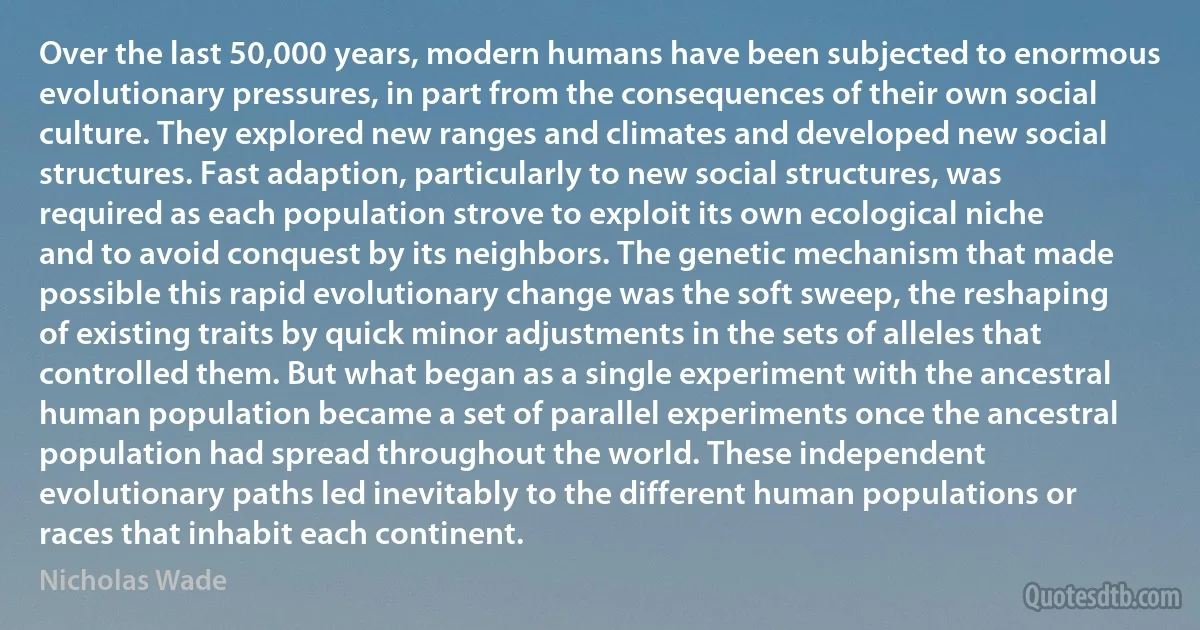
Over the last 50,000 years, modern humans have been subjected to enormous evolutionary pressures, in part from the consequences of their own social culture. They explored new ranges and climates and developed new social structures. Fast adaption, particularly to new social structures, was required as each population strove to exploit its own ecological niche and to avoid conquest by its neighbors. The genetic mechanism that made possible this rapid evolutionary change was the soft sweep, the reshaping of existing traits by quick minor adjustments in the sets of alleles that controlled them. But what began as a single experiment with the ancestral human population became a set of parallel experiments once the ancestral population had spread throughout the world. These independent evolutionary paths led inevitably to the different human populations or races that inhabit each continent.
Nicholas WadeRelated topics
begin change conquest continent control different experiment fast human last led mechanism niche once parallel possible quick rapid set single soft spread strive sweep world years reshapingRelated quotes
A series of things have come up since then that have made the problem incredibly grimmer.... The ozone hole... acid rain.... Three hundred million people have starved to death since THE POPULATION BOMB was written. The famines weren't as large as agriculturists thought they would be... due to the spread of... Green Revolution technology into the poor countries.... What makes us nervous right now is that we're faced with again having to do something desperate to increase our food production greatly.... In 1965 we knew exactly how to do it, the question was could we deploy it fast enough-Today we have nothing left to deploy-that's very scary.... As a species we're not able to live on our income; we're living on our capital, our deep rich agricultural soils are being destroyed, water is being overpumped, and our biodiversity, our life support system-we're already far beyond what we can support.

Paul R. Ehrlich
Just as the human population was starting its unprecedented growth spurt in the late eighteenth century, this was published. It's a first edition of an essay on population by the English clergyman Thomas Malthus. Malthus made a very simple observation about the relationship between humans and resources and used it to look into the future. He pointed out that "the power of population is indefinitely greater than the power of the earth to produce subsistence for man." Food production can't increase as rapidly as human reproduction. Demand will eventually outstrip supply. Malthus goes on to say, if we don't control human reproduction voluntarily, life could end in misery, which earned him a reputation as a bit of a pessimist. But Malthus' principle remains true. The productive capacity or the Earth has physical limits and those limits will ultimately determine how many human beings it can support. m10s58-m12s18.

David Attenborough
For, strange as the statement will appear at first sight, modern metaphysics, and to a large extent modern physical science, have been groping for centuries blindly after knowledge which occult philosophy has enjoyed in full measure all the while. Owing to a train of fortunate circumstances, I have come to know that this is the case; I have come into some contact with persons who are heirs of a greater knowledge concerning the mysteries of Nature and humanity than modern culture has yet evolved; and my present wish is to sketch the outlines of this knowledge, to record with exactitude the experimental proofs I have obtained that occult science invest its adepts with a control of natural forces superior to that enjoyed by physicists of the ordinary type, and the grounds there are for bestowing the most respectful consideration on the theories entertained by occult science concerning the constitution and destinies of the human soul.

Alfred Percy Sinnett
I have already accepted the policy of Imperial preference...to the effect that a preference will be given on existing duties and on any duties which may subsequently be imposed. On this subject I think there is no difference of opinion between us. ... I am prepared to say that the key industries on which the life of the nation depends must be preserved. I am prepared to say also that, in order to keep up the present standard of production and develop it to the utmost extent possible, it is necessary that security should be give against the unfair competition to which our industries have been in the past subjected by the dumping of goods below the actual cost of production. ... I shall look at every problem simply from the point of view of what is the best method of securing the objects at which we are aiming without any regard to theoretical opinions about Free Trade or Tariff Reform.

David Lloyd George
Humans... entered the 'cognitive niche.' Remember the definition of intelligence from Chapter 2: using knowledge of how things work to attain goals in the face of obstacles. By learning which manipulations achieve which goals, humans have mastered the art of the surprise attack. They use novel, goal-oriented courses of action to overcome the Maginot Line defenses of other organisms, which can respond only over evolutionary time. The manipulations can be novel because human knowledge is not just couched in concrete instructions like 'how to catch a rabbit.' Humans analyze the world using intuitive theories of objects, forces, paths, places, manners, states, substances, hidden biochemical essences, and, for other animals and people, beliefs and desires.... People compose new knowledge and plans by mentally playing out combinatorial interactions among these laws in their mind's eye.

Steven Pinker
